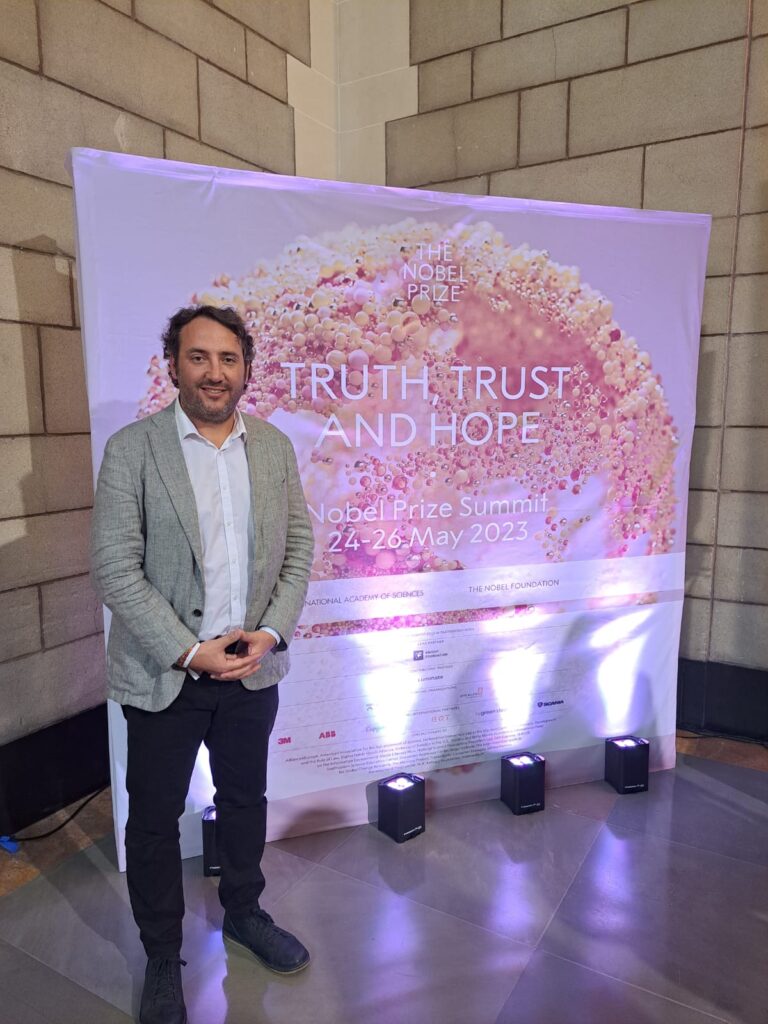Sebastián Valenzuela es parte del recién inaugurado Panel Internacional sobre el Entorno de la Información
Junio, 2023.- En Washington D.C, entre el 24 y el 26 de mayo se llevó a cabo el Nobel Prize Summit, cumbre que congrega a Premios Nobel, científicos, formuladores de políticas públicas, líderes empresariales y líderes juveniles, para explorar la pregunta: ¿Cómo podemos generar confianza en la verdad, los hechos y la evidencia científica para así tener un futuro más esperanzador para todos?
Durante la realización de esta cumbre se produjo el lanzamiento oficial del Panel Internacional sobre el Entorno de la Información (IPIE), una nueva organización global e independiente, comprometida con brindar conocimiento científico práctico sobre las amenazas al entorno de la información mundial,
El origen del IPIE se remonta a la cumbre 2021 del Premio Nobel. Desde ahí, se ha organizado de manera independiente por investigadores de todo el mundo, entre ellos, Sebastián Valenzuela, académico de la Facultad de Comunicaciones UC, investigador del Instituto Milenio Fundamentos de los Datos (IMFD), e investigador principal del Núcleo Milenio de las Desigualdades y Oportunidades Digitales (NUDOS), quien tiene el rol de ser el presidente del panel científico. Sobre su rol en esta organización, Valenzuela comenta: “Para mí pertenecer al IPIE y estar a cargo en esta primera etapa del área científica es no solo un honor, sino que también una gran oportunidad, de crecimiento personal, por supuesto, pero también una oportunidad de poder forjar nuevas redes, de poder ayudar a la disciplina en general de las comunicaciones y a proyectar la importancia que tiene en la vida de las personas. El IPEI es una plataforma que tiene una escala global y una capacidad de poder llegar a distintos tipos de público. A mí me encantaría, por ejemplo, poder usar la experiencia que estoy adquiriendo en el IPEI».
Sobre el rol de este panel en la generación de conocimiento en torno a fenómenos como la desinformación, los discursos de odio, la influencia de los algoritmos y la inteligencia artificial, entre otros, el investigador explica: “la única forma de que las políticas públicas, las legislaciones, las personas, las empresas puedan ir entendiendo el impacto que tienen todos estos desarrollos, es mediante el conocimiento y un conocimiento sistemático, un conocimiento basado en evidencia, un conocimiento científico. Si bien hay muchos investigadores en todo el mundo y muchos centros, muchas universidades preocupadas de estos temas, lo que falta es coordinar este conocimiento y poder empaquetarlo de una forma que permita a los tomadores de decisión y al público, a los medios, e incluso a los propios científicos, poder entender cuáles son las áreas de consenso, qué cosas son las que ocurren, cuáles son las que nos falta investigar más, y de esa forma poder ir colaborando en que las personas y los países puedan vivir en un medioambiente informativo sano”.

El trabajo del IPIE fue destacado por el New York Times, medio que conversó con el equipo de investigadores a cargo de las diversas áreas del panel: Wendy Chun, Saiph Savage, Charlton McIlwain, Young Mie Kim, Philip Howard, Sheldon Himelfarb, Selcan Kaynak, Sushma Raman, y Sebastián Valenzuela. En la publicación, los integrantes del Panel se refirieron al lanzamiento de la organización en el Nobel Prize Summit, donde presentaron un primer reporte, en el que cuestionan la efectividad de combatir la falsedad en línea con moderación de contenido, una de las estrategias más comunes para combatir la desinformación, argumentando que hay otras estrategias con mayor evidencia científica detrás de ellas.
Además, los investigadores explican en el reporte que, según sus hallazgos, las respuestas más efectivas ante la información falsa en línea es etiquetar contenido como “disputado”, o señalar las fuentes de los medios estatales y publicar información correctiva, desacreditando desinformación y rumores.
Mucho menos seguro, argumenta el informe, es la efectividad de los esfuerzos públicos y gubernamentales para presionar a los gigantes de las redes sociales como Facebook y Twitter para que eliminen contenido, así como los algoritmos internos de la empresa que suspenden o minimizan las cuentas infractoras. Lo mismo ocurre con los programas de alfabetización mediática que capacitan a las personas para identificar las fuentes de información errónea. Sobre esto, Valenzuela precisa: “no estamos diciendo que los programas de alfabetización informacional no funcionen. Lo que estamos diciendo es que necesitamos más evidencia de que funcionan”.
El trabajo del IPIE y el detalle de sus reportes está disponible en su sitio web, ipie.info
Fuente: Facultad de Comunicaciones de la Pontificia Universidad Católica de Chile
